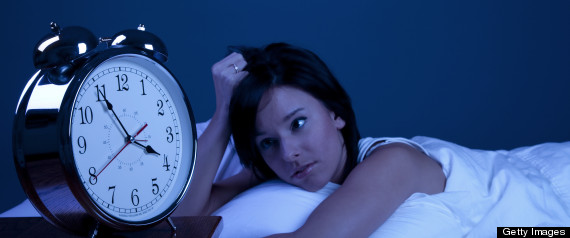You drifted off to sleep easily enough. But all of a sudden, it's 4 a.m. and you're wide awake. What gives?
To an extent, this phenomenon -- called middle insomnia, or difficulty maintaining sleep -- is normal. After all, sleep goes in cycles throughout the night, moving from deeper, slow wave sleep to lighter sleep, explains James Findley, Ph.D., CBSM, clinical director of the Behavioral Sleep Medicine Program at the University of Pennsylvania. But as the night goes on, "we're moving toward lighter stages of sleep, so we're more likely to have an awakening," he tells HuffPost. For that reason, many people are more likely to experience fragmented sleep in the morning.
Age can also be a factor; Findley notes that people tend to wake up more often during the night as they get older.
"Usually it's one of those 'you wake up, you roll over, you fall back asleep' kind of awakenings, and those are fine," Findley says. But when your middle-of-the-night-awakenings end up being more than 30 minutes per night for three or more days a week, it's a sign there could be a deeper problem at play. It might be...
…a sleep disorder.
People with insomnia not only have trouble falling asleep, but they also tend to have more awakenings throughout the night, Findley says. And sleep apnea, where a person stops breathing intermittently throughout the night causing disrupted sleep, can also trigger you to wake up.
"With sleep apnea, you might not notice it unless you have a bed partner saying you're having pauses in breathing during sleep," he says.
A more obvious sleep disorder that can also lead to nighttime wakefulness isnarcolepsy -- which is when a person has bouts of extreme sleepiness during the day, causing them to fall asleep -- though usually people would realize that this was the root of their sleep woes due to the other more obvious symptoms, Findley says.
… an underlying condition.
Sometimes it's something else inside your body that's triggering problems with staying asleep. For instance, indigestion can wake you up in the middle of the night if you ate too big of a meal before bedtime. And people who have certain psychiatric conditions -- like anxiety or bipolar disorder -- are also known to be more prone to waking up, Findley says.
In addition, an enlarged prostate can cause middle-of-the-night wakeup calls for some men, as it may cause them to wake up to use the bathroom. Similarly, some medications (such as drugs for high blood pressure) can act as diuretics, spurring nighttime bathroom use.
Sometimes the underlying condition can be quite simple: Findley adds that stress can also be a culprit. "When people are under stress, they tend to have more awakenings during the night, but that's a transient phenomenon that comes and goes," he says.
…your environment.
Findley says that practicing good sleep hygiene and keeping an optimal sleeping environment ("Your bedroom should be like a cave," he says) are typically important for initially falling asleep, but they could also play a role in helping you stay asleep.
For example, intermittent light shining into your room at night could wake you up without you even realizing it. "Sometimes light coming through the shades can be a problem, so you can get heavy curtains to cover that," Findley says. Same with light that may peek in from under a door, or the shine from an alarm clock. An easy fix? He suggests turning the alarm clock away from your face as you sleep.
Same goes for noise -- the sound of a loud truck or ambulance in the middle of the night could be enough to jolt you awake. Short of soundproofing your room, Findley suggests using a white noise machine (he doesn't recommend other sounds, like rainforest sounds, since they have variations in volume and pitch) or even ear plugs while sleeping if you're sensitive to noise.
While practicing good before-sleep habits -- like not eating a huge, heavy meal, or exercising, right before bedtime -- are mostly only good for falling asleep, Findley says they could play a small part in how well you stay asleep, too. He adds that people who struggle to stay asleep should try to avoid taking naps during the day so that they'll be more tired when night comes around. But -- and this is a big "but" -- if you need to do something where your or others' safety will be in danger if you don't nap (like driving home after work, for instance) he advises taking a snooze for about 45 minutes. Any longer than that, and you'll enter deep sleep, which can affect your nighttime shuteye. (For more napping tips, click here.)
Alcohol is also a known sleep disruptor, with recent research showing that it can cause disrupted sleep by affecting normal sleep rhythms. Particularly, that study, published in the journal Alcoholism: Clinical & Experimental Research, showed that alcohol seems to up the time spent in "deep sleep," but reduces time spent in REM sleep by disrupting sleep in this stage.
So what to do if you are one of those people who constantly wakes up in the middle of the night? Findley offers these tips:
- Don't stay in bed. If you can't drift back to dreamland after about 20 minutes, he recommends getting out of bed and doing a quiet, relaxing activity like stretching, reading or doing crossword puzzles.
- Avoid your phone or tablet. Do not turn on any electronics, because the blue-spectrum light emitted from such objects is known to impede sleep.
If you find yourself having chronic problems staying asleep at night, Findley recommends talking to your doctor about having a possible sleep study. And if it's feasible, he also says that cognitive behavioral therapy is the best treatment for insomnia -- including middle of the night insomnia.
Read more here

No comments:
Post a Comment